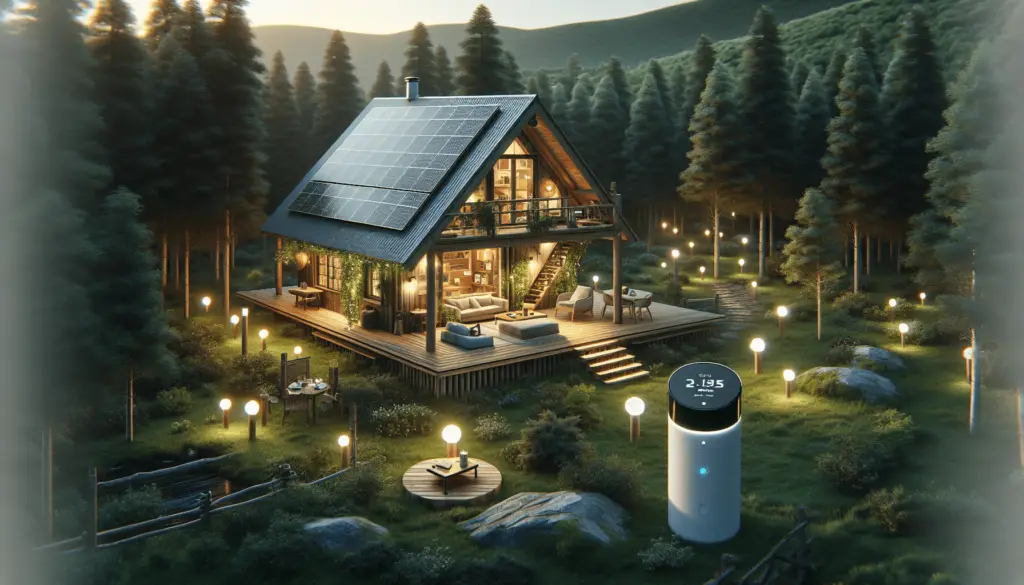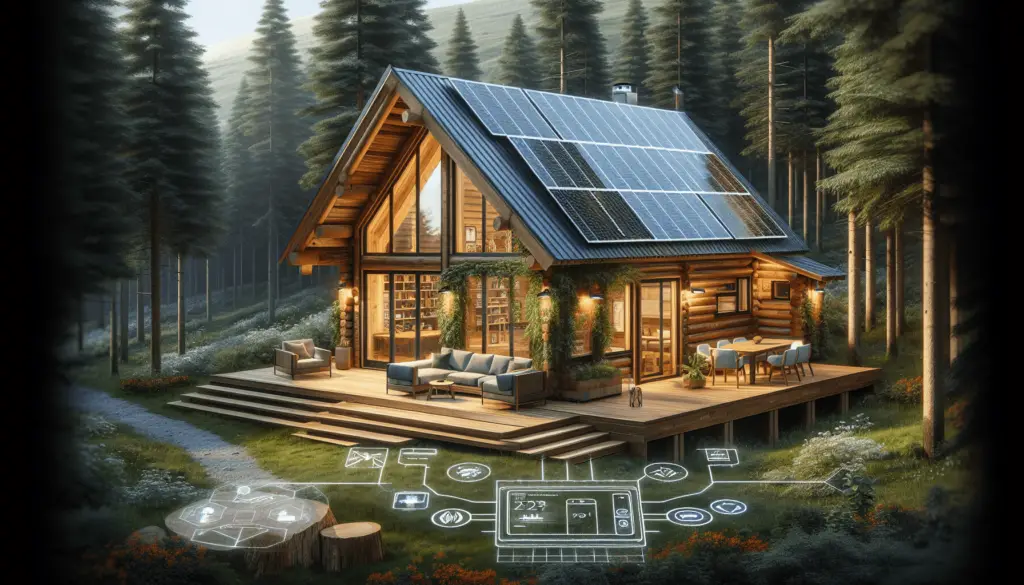Are you interested in living off-grid but still want to enjoy the convenience and efficiency of smart home technologies? In this article, we will explore how you can integrate smart home technologies with off-grid living. Let’s dive in and discover how you can create a sustainable and technologically advanced living environment without relying on the grid.

Understanding Off-Grid Living
Living off-grid means being self-sufficient and not relying on public utilities such as water, electricity, or gas. It involves generating your energy, collecting rainwater, and managing waste on your property. Off-grid living offers independence and control over your resources but requires careful planning and sustainable practices. It is a lifestyle choice that promotes sustainability and environmental consciousness.
Benefits of Off-Grid Living
Living off-grid offers various benefits, including reduced utility bills, increased self-reliance, and a reduced carbon footprint. By generating your electricity from renewable sources such as solar panels or wind turbines, you can lower your environmental impact and contribute to a cleaner planet. Off-grid living also allows you to disconnect from the stress of modern life and connect with nature in a more profound way.
Smart Home Technologies for Off-Grid Living
Integrating smart home technologies with off-grid living can enhance your lifestyle and make your home more efficient and comfortable. Smart devices such as thermostats, lighting systems, and security cameras can be controlled remotely, reducing energy consumption and increasing security. By connecting these devices to a centralized hub, you can monitor and manage your home’s energy usage and optimize performance.
Energy Management Systems
Energy management systems help you monitor and control your energy usage, optimizing efficiency and reducing waste. By tracking your energy consumption in real-time and analyzing patterns, you can make informed decisions about when and how to use electricity. Smart meters, solar inverters, and battery storage systems are essential components of an energy management system for off-grid living.
Home Automation
Home automation allows you to automate everyday tasks such as adjusting the temperature, turning on lights, or locking doors remotely. By programming routines and schedules, you can optimize energy usage and increase convenience. Smart plugs, sensors, and voice-activated assistants are examples of home automation devices that can make your off-grid living experience more comfortable and efficient.
Renewable Energy Sources
Generating electricity from renewable sources is essential for off-grid living. Solar panels, wind turbines, and hydroelectric systems can provide a clean and sustainable energy supply, reducing your reliance on fossil fuels. By combining multiple renewable energy sources and storing excess energy in batteries, you can ensure a reliable power supply for your off-grid home.
Solar Power
Solar power is one of the most popular renewable energy sources for off-grid living. Solar panels convert sunlight into electricity, providing a clean and reliable energy source. By installing a solar power system on your property, you can generate electricity during the day and store excess energy in batteries for use at night. Solar power is a cost-effective and environmentally friendly solution for off-grid electricity generation.
Wind Power
Wind power is another renewable energy source that can supplement your off-grid power supply. Wind turbines harness the kinetic energy of the wind and convert it into electricity. In locations with consistent wind patterns, wind power can be a reliable source of renewable energy. By combining solar and wind power systems, you can create a hybrid renewable energy solution that maximizes energy production.
Water Management Systems
Collecting and managing water is essential for off-grid living. Rainwater harvesting systems, greywater recycling, and water purification systems can help you reduce water consumption and ensure a sustainable water supply. By capturing rainwater from your roof, filtering and storing it in tanks, you can meet your water needs without relying on public water sources.
Rainwater Harvesting
Rainwater harvesting involves collecting rainwater from your roof and storing it for later use. By installing a system of gutters, downspouts, and storage tanks, you can capture rainwater and use it for drinking, cooking, and irrigation. Rainwater harvesting is a sustainable practice that reduces your reliance on public water sources and helps conserve freshwater resources.
Greywater Recycling
Greywater is wastewater from household activities such as showering, laundry, and dishwashing. Greywater recycling systems treat and filter greywater for reuse in non-potable applications such as irrigation or toilet flushing. By recycling greywater, you can reduce water consumption and minimize wastewater disposal, making your off-grid home more sustainable and self-sufficient.

Waste Management and Composting
Managing waste is an essential aspect of off-grid living. Composting organic waste, recycling materials, and minimizing waste generation can help you reduce your environmental impact and promote sustainable practices. By composting food scraps and yard waste, you can create nutrient-rich soil for your garden and reduce the amount of waste sent to landfills.
Composting
Composting is the process of decomposing organic matter to produce compost, a valuable soil amendment. By composting food scraps, yard waste, and other organic materials, you can divert waste from landfills and create nutrient-rich soil for gardening. Composting is a sustainable practice that reduces greenhouse gas emissions and improves soil health, making it an essential part of off-grid living.
Recycling
Recycling materials such as paper, plastic, glass, and metal is crucial for reducing waste and conserving resources. By separating recyclable materials from your trash and sending them to recycling facilities, you can help reduce your environmental footprint and promote a circular economy. Recycling is a simple yet effective way to minimize waste and protect the planet for future generations.
Conclusion
Integrating smart home technologies with off-grid living can enhance your lifestyle and increase the efficiency of your home. By combining renewable energy sources, water management systems, and waste management practices, you can create a sustainable and self-sufficient living environment. Off-grid living offers independence, sustainability, and a closer connection to nature, making it an appealing choice for those seeking a more conscious and environmentally friendly lifestyle. Embrace the challenge and rewards of off-grid living by integrating smart home technologies for a modern and sustainable living experience.
